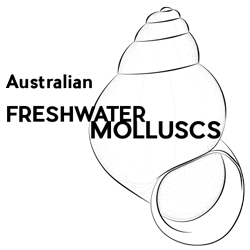
According to Korniushin (2000) the reduction of the outer lateral teeth in the right valve is "the most remarkable feature of M. lacusedes. This character seems to be constant. The yellowish colour of the periostracum also seems to be diagnostic."
Sphaerium (Musculium) lacusedes (Iredale, 1943)
Common name: Pea shell, pea clam, pill clam
Class Bivalvia
Infraclass Heteroconchia
Cohort Heterodonta
Megaorder Neoheterodontei
Order Sphaeriida
Superfamily Sphaerioidea
Family Sphaeriidae
Subfamily Sphaeriinae
Genus Sphaerium Scopoli, 1777
Type species: Tellina cornea Linnaeus, 1758. Europe.
Subgenus Musculium Link, 1807
Original name: Sphaerinova lacusedes Iredale,1943. In Iredale (1943). A basic list of the freshwater Mollusca of Australia. Australian Zoologist 10: 188 - 230.
Type locality: Great Lake, Tasmania.
Data available is at present insufficient. Apparently rare, found mostly in lakes, but at least one lot from the South Esk River is known. Suspension and deposit feeder.
Central Tasmania.
Korniushin, A. V. (2000). Review of the family Sphaeriidae (Mollusca: Bivalvia) of Australia, with the description of four new species. Records of the Australian Museum 52: 41-102.
Kuiper, J. G. J. (1983). The Sphaeriidae of Australia. Basteria 47: 3-52.
Lee, T. (2019). Sphaeriidae Deshayes, 1855 (1820). Pp. 197-201 in C. Lydeard & Cummings, K. S. Freshwater Mollusks of the World: a Distribution Atlas. Baltimore, John Hopkins University Press.
Lee, T. & Ó Foighil, D. (2003). Phylogenetic structure of the Sphaeriinae, a global clade of freshwater bivalve molluscs, inferred from nuclear (ITS-1) and mitochondrial (16S) ribosomal gene sequences. Zoological Journal of the Linnean Society 137: 245-260.
Smith, B. J. & Kershaw, R. C. (1981). Tasmanian Land and Freshwater Molluscs. Hobart, University of Tasmania.